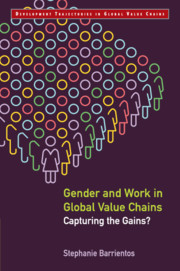Book contents
- Frontmatter
- Dedication
- Contents
- List of Tables
- List of Figures
- List of Abbreviations
- Preface
- 1 Introduction
- 2 Retail Shift and Global Sourcing
- 3 Gender Patterns of Work in Global Retail Value Chains
- 4 Global (re)Production Networks Analysis
- 5 Smallholder (dis)Articulations: The Cocoa–Chocolate Value Chain
- 6 Mixed Outcomes: Downgrading and Upgrading in African Horticulture
- 7 Contested Terrain: The Limits of Social Compliance in Asian Apparel
- 8 Upgrading Strategies: Innovation, Skills and Rights
- 9 Governance Challenges: Promoting Gender-Equitable Value Chains
- 10 Concluding Reflections: Future of Work
- References
- Index
1 - Introduction
Published online by Cambridge University Press: 26 April 2019
- Frontmatter
- Dedication
- Contents
- List of Tables
- List of Figures
- List of Abbreviations
- Preface
- 1 Introduction
- 2 Retail Shift and Global Sourcing
- 3 Gender Patterns of Work in Global Retail Value Chains
- 4 Global (re)Production Networks Analysis
- 5 Smallholder (dis)Articulations: The Cocoa–Chocolate Value Chain
- 6 Mixed Outcomes: Downgrading and Upgrading in African Horticulture
- 7 Contested Terrain: The Limits of Social Compliance in Asian Apparel
- 8 Upgrading Strategies: Innovation, Skills and Rights
- 9 Governance Challenges: Promoting Gender-Equitable Value Chains
- 10 Concluding Reflections: Future of Work
- References
- Index
Summary
Rise of Global Retail
The rise of global retail has transformed the production, distribution and sale of food and consumer goods with significant consequences for the gender profile of work in the Global South. Global retailers play a key role in the provision and global sourcing of a wide range of consumer goods across national borders through global value chains (Coe and Wrigley 2009; Hamilton, Petrovic and Senauer 2011). Global value chains are summed up as ‘the full range of activities which are required to bring a product or service from conception, through the different phases of production (involving a combination of physical transformation and the input of various producer services), delivery to final consumers, and final disposal after use’ (Kaplinsky and Morris 2002, 8). Well established in North America and Europe, global retail is rapidly becoming more prevalent in emerging and lower-income economies (Reardon et al. 2003).
Women are drawn into global value chains as farmers, wage-workers, employees, buyers and customers (Dolan and Sorby 2003; Hale and Wills 2005). As retailers expand their market scope, they are commercializing many unpaid activities previously undertaken by women within households. Global retail and sourcing generate paid work for hundreds of millions of workers in emerging and low-income countries, drawing in a significant proportion of women with limited previous labour market access (ILO 2015b). Often they are involved in producing goods women had made or prepared in the home. Retail value chains link firms at each stage from production through distribution to final retail and final consumers (Kaplinsky and Morris 2002). A key argument of this book is that their growth has been based on commercialization of many activities previously undertaken, unpaid, by women in the home, helping to draw women into fragmented paid work in their production. They therefore blur traditional gendered boundaries between paid work in commercial production and unpaid work within households.
These processes play out differently across geographical locations, where gender norms shaping the division of labour and women's participation in productive and reproductive activities can vary greatly. Often, retail can disrupt long-established gender norms, but the outcomes for promoting gender equality appear mixed both across sectors and locations. Women workers are largely concentrated in low-wage, labour-intensive production.
- Type
- Chapter
- Information
- Gender and Work in Global Value ChainsCapturing the Gains?, pp. 1 - 21Publisher: Cambridge University PressPrint publication year: 2019

